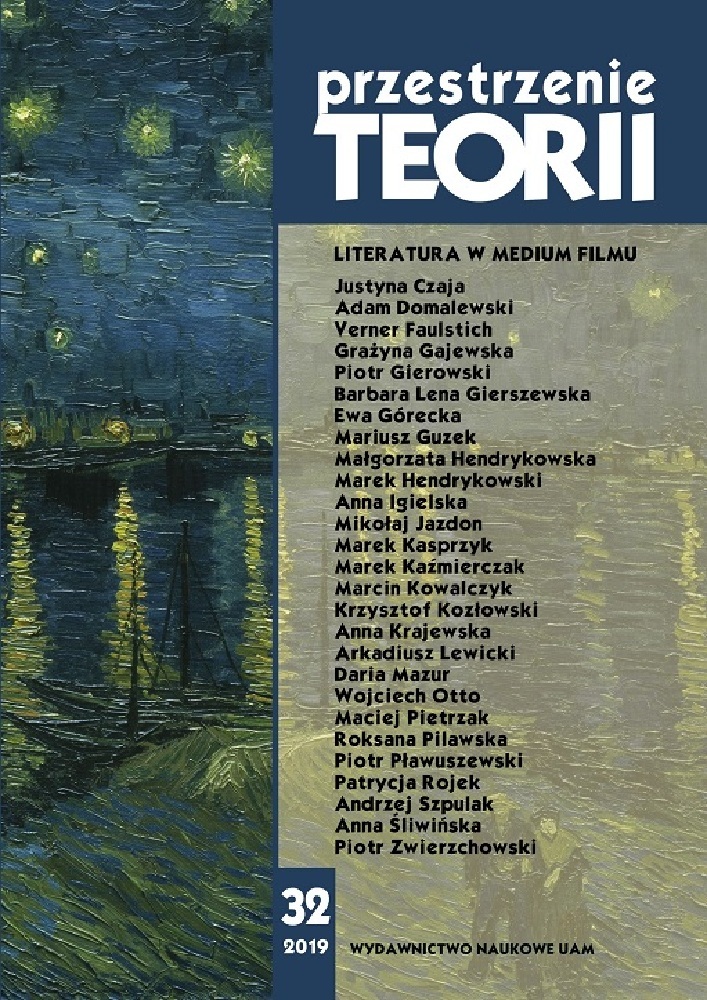Abstract
Gajewska Grażyna, Cyborgi – literacko-filmowe figury dyskursu interaktywnego [Cyborgs – Literary and Film Figures of Interactive Discourse]. „Przestrzenie Teorii” 32. Poznań 2019, Adam Mickiewicz University Press, pp. 179–196. ISSN 1644-6763. DOI 10.14746/pt.2019.32.9.
The author analyzes the figure of the cyborg in science fiction literature and film. The text begins by showing this kind of literary work in the theoretical field and presents it as an interactive discourse. The author describes the scientific roots of constructing a human-technical hybrid, emphasizing the ideological and political context of this research. In this approach, the cyborg appears as a participant in and also a hostage of the Cold War. Next, the author finds literary and film creations of cyborgs inspired by this political and military heritage. The article also presents alternative images of cyborgs co-creating a feminist and postcolonial discourse. They were also included in specific policies and strategies aimed at deconstructing concepts such as sex and gender, sexuality, race, nation, social class. The main thesis of the article is that as fictitious and real entities, cyborgs are prone to ideologization and burdened with the obligation to politicize. Therefore, when studying cyborgs in literature, film and comics, we must ask what ideologies and politicians they serve.
References
Barad K., Posthumanist Performativity: Toward an Understanding of How Matter Comes to Matter, “Signs. Journal of Women in Culture and Society” 2003, vol. 28, no. 3.
Cybersexualities. A Reader on Feminist Theory, Cyborgs and Cyberspace, red. J. Wolmark, Edinburgh 1999.
Derrida J., Prepare Yourself to Experience the Future and Welcome the Monster, <http://www.hydra.umn.edu/derrida/monster.html>.
Foucault M., Trzeba bronić społeczeństwa. Wykłady w Collège de France, 1976, przeł. M. Kowalska, Warszawa 1998.
Haraway D., Manifesto for Cyborg: Science, Technology, and Socialist Feminism in the 1980s, „Socialist Review” 1985, nr 80.
Haraway D., Staying with the Trouble. Making Kin in the Chthulucene, Durham & London 2016.
hooks bell, Margines jako miejsce radykalnego otwarcia, przeł. E. Domańska, „Literatura na Świecie” 2008, nr 1/2.
Hyży E., Kobieta, ciało, tożsamość, Kraków 2003.
Nayar P.K., Posthumanism, Cambridge 2017.
Pepperell R., The Posthuman Condition: Consciousness Beyond the Brain, Bristol 2003.
Posthuman Glossary, red. R. Braidotti, M. Hlavajova, London 2018.
Roberts A., Science Fiction. The New Critical Idiom, London and New York 2006.
The Cyborg Handbook, ed. by C.H. Gray and others, New York and London 1995.
Toffler A., Szok przyszłości, przeł. E. Ryszka, W. Osiatyński, Warszawa 1974.
License
Authors
Authors of texts accepted for publication in Przestrzenie Teorii are required to complete, sign and return to the editor's office the Agreement for granting a royalty-free license to works with a commitment to grant a CC sub-license.
Under the agreement, the authors of texts published in Przestrzenie Teorii grant the Adam Mickiewicz University in Poznań a non-exclusive, royalty-free license and authorize the use of Attribution-NonCommercial-NoDerivatives 4.0 International (CC BY-NC-ND 4.0) Creative Commons sub-license.
The authors retain the right to continue the free disposal of the work.
Users
Interested Internet users are entitled to use works published in Przestrzenie Teorii since 2015, for non-commercial purposes only, under the following conditions:
- attribution - obligation to provide, together with the distributed work, information about the authorship, title, source (link to the original work, DOI) and the license itself.
- no derivatives - the work must be preserved in its original form, without the author's consent it is not possible to distribute the modified work, such as translations, publications, etc.
Copyrights are reserved for all texts published before 2015.
Miscellaneous
Adam Mickiewicz University in Poznań retains the right to magazines as a whole (layout, graphic form, title, cover design, logo etc.).

